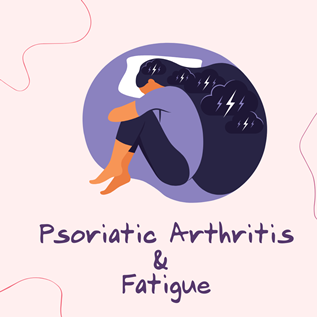29 November 2024
Psoriatic Arthritis and Reducing Fatigue
Living with psoriatic arthritis (PsA) can impact a person in many ways, including dealing with fatigue. The feeling of exhaustion alongside joint pain or stiffness can make day-to-day life challenging.
There are practical steps you can take to manage fatigue and regain some of your energy, some suggestions can be found below.
Good quality sleep

Getting enough restful sleep is one of the best ways to reduce fatigue. The amount of sleep someone needs to feel well-rested can vary from person to person. On average adults need 7 to 9 hours sleep, while children require 9 to 13 hours sleep.
You can ensure you get a good nights’ rest by practicing good “sleep hygiene”. It’s essential to stick to a regular routine. Try avoiding screens in the lead to bedtime and ensure your bedroom is dark, quiet and a comfortable temperature.
Investing in supportive pillows or other sleep aids may help with joint pain.
During this year’s Psoriasis Awareness Week, Dr. Catherine O’Leary, filmed a Q&A on psoriasis and sleep. She answered FAQs submitted by our members and explored practical tips.
You can check out the video on YouTube, via this link.
Physical Activity
Though it might be challenging, exercising regularly can reduce fatigue by boosting your overall energy levels and help improve sleep quality.
Low-impact activities like walking, swimming, or yoga can be particularly beneficial, depending on the joint pain you are experiencing. You can choose to do seated exercises if they are more comfortable.
Healthy Lifestyle Changes
Having a balanced, nutritious diet and avoiding alcohol or smoking can help maintain a healthy lifestyle and reduce the level of inflammation in your body. Eating a diet high in fruit and veg, which are rich in vitamins and minerals is a good way to support overall well-being.
Balance Activity and Rest
It’s important to listen to your body. Rather than trying to complete lots of activities in one day, prioritise and choose the most urgent tasks. You can break activities into smaller chunks and take regular breaks. For example, you may want to do to 10-20 minutes of cleaning at a time and then relax by reading a book or watching a show.
Communicate With Your Network
It’s always okay to ask for support from the people around you. Whether you arrange a car share to social events or divide up household responsibilities, being aware of your limits and getting help from those around you can prevent overexertion.
Monitor Your General Health
Feeling unusually tired on a regular basis can sometimes be as a result of a deficiency. If you notice any changes in your health, it’s important to get in touch with your GP so they can run the appropriate tests and rule anything out.
Alternative Therapies
Practicing techniques like guided meditation, getting a massage or acupuncture are a great way to reduce the physical symptoms of PsA. Equally, these treatments often reduce levels of stress, which can make symptoms of fatigue worse.
Get The Right Treatment
Managing inflammation with the right treatment is necessary for reducing the pain from PsA and feelings of fatigue. Communicating with your GP or specialist will ensure you find the right treatment plan. There are many treatments for PsA, and they work differently for everyone. Discuss your symptoms with you doctor and they can make the right suggestions and, in some cases, may refer you other specialists such as physiotherapists or occupational therapists.
Contact Us
Fatigue from PsA can be frustrating, but by making small changes you can make a positive improvement to your symptoms. If you are ever struggling or need someone to talk to you can contact our free, confidential helpline.
Ring: 01604 251 620, email: mail@psoriasis-association.org.uk or WhatsApp: 07387 716 439.
Phone, email and WhatsApp available Monday to Friday 09.00 to 16.00.
You can find more information and resources across our psoriatic arthritis, treatments for PsA, and leaflets & information sheets webpages.